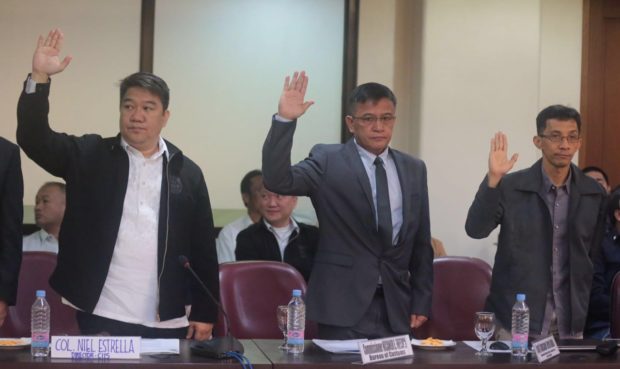
(L-R) customs officials Col. Neil Estrella, Commissioner Nicanor Faeldon, Deputy Commissioner Gerardo Gambala. INQUIRER / Grig C. Montegrande
“All the drugs were contaminated. Everyone’s touching it. Everyone’s taking selfies with the drugs. I was really taken aback!”
This was how Wilkins Villanueva, regional director of the Philippine Drug Enforcement Agency (PDEA), described the Bureau of Customs’ (BOC) alleged mishandling of the 605 kilograms of smuggled “shabu” (crystal meth) seized from a Valenzuela City warehouse.
Besides Villanueva, lawmakers also assailed the BOC officials for procedural violations, which may undermine any charges that can be filed over the contraband shipped from China.
This prompted the House dangerous drugs committee chair, Rep. Robert Ace Barbers, to tell Customs Commissioner Nicanor Faeldon to resign and spare President Rodrigo Duterte further embarrassment.
“Commissioner, it’s a pity the President trusted you. You were from nowhere. We don’t even know why you were placed there,” Barbers said.
“You should resign to avoid further embarrassment to our President. All of you, you should all resign. I’m waiting for you to submit your resignation,” he added.
But Faeldon stood his ground before the lawmakers: “I am a soldier. I do not treat this position as a job. For me, this is a mission. However, a soldier can be fired. Let the President fire me.”
Butting heads
During the hearing, Villanueva, who was cloaked with legislative immunity, said that not only was the PDEA left out of the operations initially, it also had disagreements with the BOC on the proper handling of the drug evidence.
After Faeldon sought the assistance of PDEA Director General Isidro Lapeña on the morning of May 26, Villanueva was tasked with joining the operation.
But when PDEA agents arrived at the scene in the afternoon, he was surprised that the crates, and the printing cylinders used to hide them, had already been opened by the BOC personnel.
Villanueva said that if the PDEA had its way, it would have cordoned off the drugs.
He disagreed with Faeldon and Customs Intelligence and Investigative Service Director Neil Estrella on how to properly conduct a “controlled delivery” operation on the illegal drugs and preserve the integrity of the evidence.
Controlled delivery is an investigative technique where a suspect shipment is allowed to pass through under the supervision of an authorized officer to track the people involved in the unlawful trade.
Villanueva said all five crates of illegal drugs should have been used for the operations, but Faeldon, who he said consulted his fiancée lawyer who doesn’t work for the government, insisted that only one crate be used.
“You have to guide the whole cargo. You cannot choose. But he butted in that one crate is good for us to file a case,” Villanueva said. “We did not want to agree. Many in the antidrug community are laughing at us. We insisted and failed to convince him.”
Faeldon said Villanueva’s account was 90-percent truth but “a half-truth is not the truth.”
He said he wanted to retain four crates amounting to 505 kilograms of drugs in the compound so these could be used as evidence against the warehouse owner.
Estrella explained that the drug crates were opened up so he could see for himself and “validate the information given to me.”
Not adept with law
Lawmakers did not buy the BOC officials’ reasoning.
Sagip Rep. Rodante Marcoleta noted that the PDEA had the expertise over drug operations and its position should have been given weight.
Even from the start, the raid was already on shaky ground for being based on a mere letter of authority (LOA) issued by Faeldon, instead of a search warrant, Majority Leader Rodolfo Fariñas said.
“When it reaches the judiciary, it’s dismissed. What happens is it would be illegally obtained evidence, aside from other matters that will surface later on,” Fariñas said.
“It’s so scary that you are not adept with the law,” he added.
Faeldon maintained that BOC operatives could act on suspect shipments “as long as these LOAs have something to do with the importations.”
Barbers also blew up at BOC officials for conducting the surveillance operations before the raid without seeking PDEA assistance as mandated under the Comprehensive Dangerous Drugs Act of 2002.